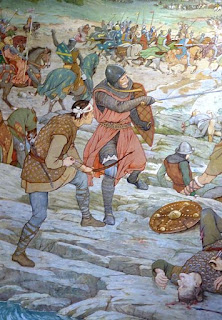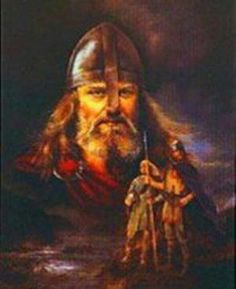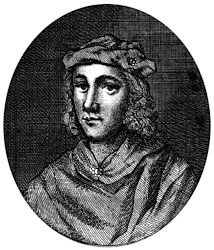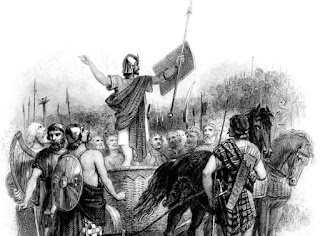Largs
Battle of Largs
It was Ketil Flatnose who 'preferred to go west across the sea to Scotland' because, he said, he thought it would be 'good living there'. Soon a host of semi-independent Viking rulers were roistering round the Scottish coast and, at the height of their power in the 10th century, a large area of the north and all the Western Isles, Caithness, Sutherland, and most of Ross belonged to the Norwegians.
Scotland won back the mainland and Alexander I King of Scots, at the time of his death in 1249, was engaged in military operations in the Western Isles.
His son, Alexander III, tried to buy back these islands from Norway and, when the attempt failed, a raid was made on Skye in 1262. There were also rumours that Alexander III was planning to win back all the Hebrides. When Haakon IV, the Norwegian king, heard of this, he swore revenge.
He was at Widewall Bay in Orkney, presumably awaiting late arrivals, when a 'great darkness came over the sun, in such a way that a small ring was clear about the outside of the sun.' The eclipse places Haakon's ships still in Norwegian waters on 5th August, dangerously late for a naval expedition.
The Scots were aware of the threat and, not knowing where the attack would come from, people in the most vulnerable coastal areas were ready to stand to arms at the shortest possible notice. In the late summer of 1263 Haakon, in his own 'great ship with its fine dragon head all gilded' led his 160-strong battle fleet into the Firth of Clyde,
He sent messengers to Alexander to discuss peace terms, and both kings were in agreement about most of the claims. Alexander, however, could not accept that Arran, Bute, and the Cumbraes should come under Norwegian rule.
Haakon then sailed into the Largs channel and anchored off the Cumbraes. Because of the shortage of provisions, the Norwegians wanted to go ashore and plunder, but Haakon prevented this and kept sending messages to the Scottish king.
These peace attempts were finally abandoned when a large body of Scots was seen to be mustering on the shore.
On Monday, October 1, a great storm hit the Norwegian fleet and many ships, including the king's, broke moorings and drifted with the wind. One merchant ship and some longships were driven aground on the Largs shore. The Scots attacked them, but when a lull in the storm allowed Haakon to send in reinforcements, the Scots retreated. During the night, the Vikings stayed ashore, but the Scots were able to remove some of the merchant ship's cargo,
The next morning, King Haakon landed with more men, but, when fighting broke out, he was persuaded to return to the fleet in a small boat
One Norwegian leader took up position on a grassy mound with 200 men, while about 600 more Norwegians were on the shore. A large b of Scots-about 500 knights mounted on Spanish1,000-foot horses and about 1,000 foot soldiers armed with, swords, bows and axes-attacked the mound.
The Norsemen there, afraid of being surrounded, began making their way to the beach. Others already there panicked when they saw their comrades retreating, and there was a scramble for the boats, accompanied by a storm of stones and arrows. Some Norwegians were killed. by Scots and others drowned as their boats capsized in the sea. Other Norwegians made a stand on the beach.
Still, there was no great battle-a clumsy charge of horse along the beach, a counter-charge; then the Scots fell back to the escarpment, from where they watched as the Norwegians struggled out to their ships and sailed away. Later chroniclers would call this a 'cruel' battle in which thousands fell on both sides – when the outcome was probably decided by the weather.
Nevertheless, as author John Prebble has stated, it was a decisive exchange. Though he reassembled his fleet, Haakon retired to Kirkwall, "where death and the next bitter winter took the surrender of his aged body".
Three years later, by the Treaty of Perth, his successor released the Western Isles to Scotland for 4,000 merks of refined silver and an annual payment of 100 more. Whether these were ever paid, no record has been found.












Comments
Post a Comment